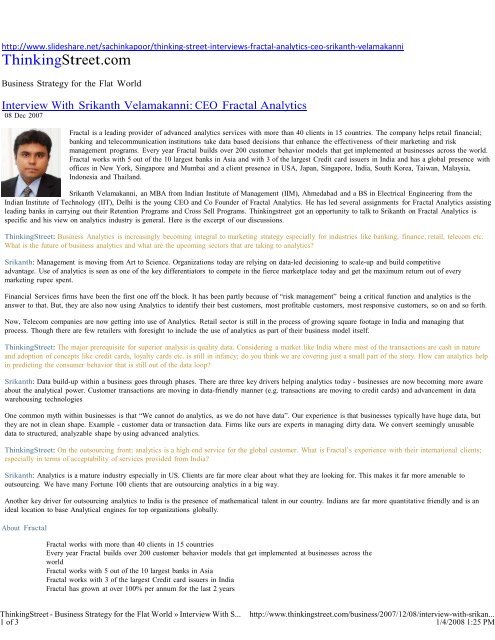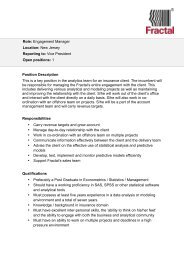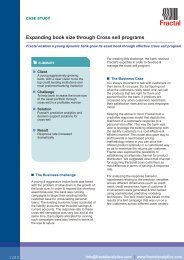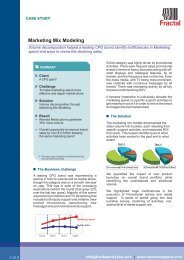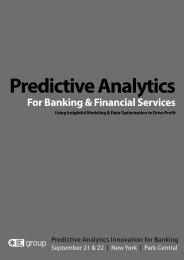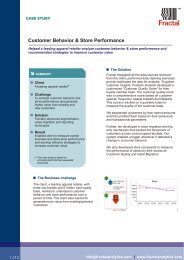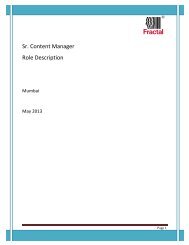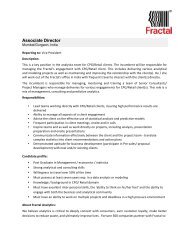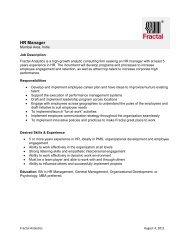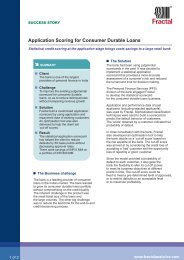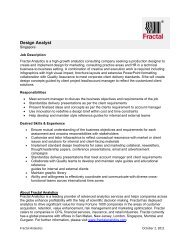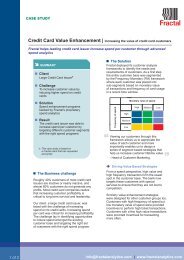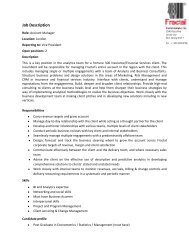Interview with Srikanth Velamakanni - Fractal Analytics
Interview with Srikanth Velamakanni - Fractal Analytics
Interview with Srikanth Velamakanni - Fractal Analytics
You also want an ePaper? Increase the reach of your titles
YUMPU automatically turns print PDFs into web optimized ePapers that Google loves.
http://www.slideshare.net/sachinkapoor/thinking-street-interviews-fractal-analytics-ceo-srikanth-velamakanni<br />
ThinkingStreet.com<br />
Business Strategy for the Flat World<br />
<strong>Interview</strong> With <strong>Srikanth</strong> <strong>Velamakanni</strong>: CEO <strong>Fractal</strong> <strong>Analytics</strong><br />
08 Dec 2007<br />
<strong>Fractal</strong> is a leading provider of advanced analytics services <strong>with</strong> more than 40 clients in 15 countries. The company helps retail financial;<br />
banking and telecommunication institutions take data based decisions that enhance the effectiveness of their marketing and risk<br />
management programs. Every year <strong>Fractal</strong> builds over 200 customer behavior models that get implemented at businesses across the world.<br />
<strong>Fractal</strong> works <strong>with</strong> 5 out of the 10 largest banks in Asia and <strong>with</strong> 3 of the largest Credit card issuers in India and has a global presence <strong>with</strong><br />
offices in New York, Singapore and Mumbai and a client presence in USA, Japan, Singapore, India, South Korea, Taiwan, Malaysia,<br />
Indonesia and Thailand.<br />
<strong>Srikanth</strong> <strong>Velamakanni</strong>, an MBA from Indian Institute of Management (IIM), Ahmedabad and a BS in Electrical Engineering from the<br />
Indian Institute of Technology (IIT), Delhi is the young CEO and Co Founder of <strong>Fractal</strong> <strong>Analytics</strong>. He has led several assignments for <strong>Fractal</strong> <strong>Analytics</strong> assisting<br />
leading banks in carrying out their Retention Programs and Cross Sell Programs. Thinkingstreet got an opportunity to talk to <strong>Srikanth</strong> on <strong>Fractal</strong> <strong>Analytics</strong> is<br />
specific and his view on analytics industry is general. Here is the excerpt of our discussions.<br />
ThinkingStreet: Business <strong>Analytics</strong> is increasingly becoming integral to marketing strategy especially for industries like banking, finance, retail, telecom etc.<br />
What is the future of business analytics and what are the upcoming sectors that are taking to analytics?<br />
<strong>Srikanth</strong>: Management is moving from Art to Science. Organizations today are relying on data-led decisioning to scale-up and build competitive<br />
advantage. Use of analytics is seen as one of the key differentiators to compete in the fierce marketplace today and get the maximum return out of every<br />
marketing rupee spent.<br />
Financial Services firms have been the first one off the block. It has been partly because of “risk management” being a critical function and analytics is the<br />
answer to that. But, they are also now using <strong>Analytics</strong> to identify their best customers, most profitable customers, most responsive customers, so on and so forth.<br />
Now, Telecom companies are now getting into use of <strong>Analytics</strong>. Retail sector is still in the process of growing square footage in India and managing that<br />
process. Though there are few retailers <strong>with</strong> foresight to include the use of analytics as part of their business model itself.<br />
ThinkingStreet: The major prerequisite for superior analysis is quality data. Considering a market like India where most of the transactions are cash in nature<br />
and adoption of concepts like credit cards, loyalty cards etc. is still in infancy; do you think we are covering just a small part of the story. How can analytics help<br />
in predicting the consumer behavior that is still out of the data loop?<br />
<strong>Srikanth</strong>: Data build-up <strong>with</strong>in a business goes through phases. There are three key drivers helping analytics today - businesses are now becoming more aware<br />
about the analytical power. Customer transactions are moving in data-friendly manner (e.g. transactions are moving to credit cards) and advancement in data<br />
warehousing technologies<br />
One common myth <strong>with</strong>in businesses is that “We cannot do analytics, as we do not have data”. Our experience is that businesses typically have huge data, but<br />
they are not in clean shape. Example - customer data or transaction data. Firms like ours are experts in managing dirty data. We convert seemingly unusable<br />
data to structured, analyzable shape by using advanced analytics.<br />
ThinkingStreet: On the outsourcing front; analytics is a high end service for the global customer. What is <strong>Fractal</strong>’s experience <strong>with</strong> their international clients;<br />
especially in terms of acceptability of services provided from India?<br />
<strong>Srikanth</strong>: <strong>Analytics</strong> is a mature industry especially in US. Clients are far more clear about what they are looking for. This makes it far more amenable to<br />
outsourcing. We have many Fortune 100 clients that are outsourcing analytics in a big way.<br />
Another key driver for outsourcing analytics to India is the presence of mathematical talent in our country. Indians are far more quantitative friendly and is an<br />
ideal location to base Analytical engines for top organizations globally.<br />
About <strong>Fractal</strong><br />
<strong>Fractal</strong> works <strong>with</strong> more than 40 clients in 15 countries<br />
Every year <strong>Fractal</strong> builds over 200 customer behavior models that get implemented at businesses across the<br />
world<br />
<strong>Fractal</strong> works <strong>with</strong> 5 out of the 10 largest banks in Asia<br />
<strong>Fractal</strong> works <strong>with</strong> 3 of the largest Credit card issuers in India<br />
<strong>Fractal</strong> has grown at over 100% per annum for the last 2 years<br />
ThinkingStreet - Business Strategy for the Flat World » <strong>Interview</strong> With S... http://www.thinkingstreet.com/business/2007/12/08/interview-<strong>with</strong>-srikan...<br />
1 of 3 1/4/2008 1:25 PM
<strong>Fractal</strong> has consistently provided at least 20% reduction in delivery timelines through the usage of our data models, tools and<br />
processes<br />
Pioneered the development of Debit Scorecards, which is a scoring product for customers <strong>with</strong>out adequate credit history<br />
<strong>Fractal</strong> has a global presence <strong>with</strong> offices in New York, Singapore and Mumbai<br />
<strong>Fractal</strong> has client presence in USA, Japan, Singapore, India, South Korea, Taiwan, Malaysia, Indonesia, Thailand, UAE<br />
ThinkingStreet: To provide valuable insights to the client any team will need deep domain experience. In catering to international clients,<br />
do you see this requirement as a constraint for <strong>Fractal</strong>; especially for the industry where developed markets work in a very different way than<br />
India, when it comes to <strong>Analytics</strong>?<br />
<strong>Srikanth</strong>: Domain expertise is critical for solving the kind of problems that we face. <strong>Fractal</strong> has been working in this area for more than 7 years<br />
now. We have a robust mechanism of synthesizing all our learning from hundreds of projects that we have executed in Financial Services, Retail,<br />
Telecom & CPG domains. We have our proprietary “Country specific data models” that help us in pulling together all our learning for solving that<br />
business problem in that country.<br />
Organizations are becoming global today. The fact that we are working for banks in Asia, US & India actually helps us in transferring learning<br />
from one region to another.<br />
ThinkingStreet: From the global sourcing perspective, in analytics, what kind of work can be easily off-shored and which ones are the most<br />
challenging?<br />
<strong>Srikanth</strong>: <strong>Analytics</strong> straddle across Data Management, MIS reporting, predictive models development, through Business Consulting. Generally,<br />
except for pure Business Consulting, we have been successfully executing analytical projects across the spectrum for our clients.<br />
ThinkingStreet: How are the billing rates and margins in your industry, say in comparison to other outsourcing industry like IT services or equity<br />
research?<br />
<strong>Srikanth</strong>: <strong>Analytics</strong> is considered a specialized service and is not commoditized as much say IT services. Specialized analytics consulting can<br />
command very good rates.<br />
ThinkingStreet: What are the challenges your industry is facing; especially in global sourcing context?<br />
<strong>Srikanth</strong>: Some of the challenges we face are the outsourcing mindset <strong>with</strong>in US businesses and the talent shortage in the country.<br />
ThinkingStreet: With Cognizant paying 135mn USD for MarketRx which is in a similar space as yours, how does the industry’s future look to<br />
you?<br />
<strong>Srikanth</strong>: Very bright!<br />
ThinkingStreet: What are <strong>Fractal</strong> <strong>Analytics</strong> business growth plans?<br />
<strong>Srikanth</strong>: We have very aggressive plans to consolidate our strong position. We have opened two new delivery centers in India - one in<br />
Delhi, one in Kolkata. Our business plans is to grow more than 100% for next 2 years.<br />
<strong>Srikanth</strong> <strong>Velamakanni</strong>, an MBA from Indian Institute of Management (IIM), Ahmedabad and a BS in Electrical Engineering from the Indian Institute of<br />
Technology (IIT), Delhi is the young CEO and Co Founder of <strong>Fractal</strong> <strong>Analytics</strong>. He has led several assignments for <strong>Fractal</strong> <strong>Analytics</strong> assisting leading banks in<br />
carrying out their Retention Programs and Cross Sell Programs. Thinkingstreet got an opportunity to talk to <strong>Srikanth</strong> on <strong>Fractal</strong> <strong>Analytics</strong> is specific and his view<br />
on analytics industry is general. Here is the excerpt of our discussions.<br />
ThinkingStreet: Business <strong>Analytics</strong> is increasingly becoming integral to marketing strategy especially for industries like banking, finance, retail, telecom etc.<br />
What is the future of business analytics and what are the upcoming sectors that are taking to analytics?<br />
<strong>Srikanth</strong>: Management is moving from Art to Science. Organizations today are relying on data-led decisioning to scale-up and build competitive<br />
advantage. Use of analytics is seen as one of the key differentiators to compete in the fierce marketplace today and get the maximum return out of every<br />
marketing rupee spent.<br />
Financial Services firms have been the first one off the block. It has been partly because of “risk management” being a critical function and analytics is the<br />
answer to that. But, they are also now using <strong>Analytics</strong> to identify their best customers, most profitable customers, most responsive customers, so on and so forth.<br />
ThinkingStreet - Business Strategy for the Flat World » <strong>Interview</strong> With S... http://www.thinkingstreet.com/business/2007/12/08/interview-<strong>with</strong>-srikan...
2 of 3<br />
<strong>Srikanth</strong> <strong>Velamakanni</strong>, an MBA from Indian Institute of Management (IIM), Ahmedabad and a BS in Electrical Engineering from the Indian Institute of<br />
Technology (IIT), Delhi is the young CEO and Co Founder of <strong>Fractal</strong> <strong>Analytics</strong>. He has led several assignments for <strong>Fractal</strong> <strong>Analytics</strong> assisting leading banks in<br />
carrying out their Retention Programs and Cross Sell Programs. Thinkingstreet got an opportunity to talk to <strong>Srikanth</strong> on <strong>Fractal</strong> <strong>Analytics</strong> is specific and his view<br />
on analytics industry is general. Here is the excerpt of our discussions.<br />
ThinkingStreet: Business <strong>Analytics</strong> is increasingly becoming integral to marketing strategy especially for industries like banking, finance, retail, telecom etc.<br />
What is the future of business analytics and what are the upcoming sectors that are taking to analytics?<br />
<strong>Srikanth</strong>: Management is moving from Art to Science. Organizations today are relying on data-led decisioning to scale-up and build competitive<br />
advantage. Use of analytics is seen as one of the key differentiators to compete in the fierce marketplace today and get the maximum return out of every<br />
marketing rupee spent.<br />
Financial Services firms have been the first one off the block. It has been partly because of “risk management” being a critical function and analytics is the<br />
answer to that. But, they are also now using <strong>Analytics</strong> to identify their best customers, most profitable customers, most responsive customers, so on and so forth.<br />
Now, Telecom companies are now getting into use of <strong>Analytics</strong>. Retail sector is still in the process of growing square footage in India and managing that<br />
process. Though there are few retailers <strong>with</strong> foresight to include the use of analytics as part of their business model itself.<br />
ThinkingStreet: The major prerequisite for superior analysis is quality data. Considering a market like India where most of the transactions are cash in nature<br />
and adoption of concepts like credit cards, loyalty cards etc. is still in infancy; do you think we are covering just a small part of the story. How can analytics help<br />
in predicting the consumer behavior that is still out of the data loop?<br />
<strong>Srikanth</strong>: Data build-up <strong>with</strong>in a business goes through phases. There are three key drivers helping analytics today - businesses are now becoming more aware<br />
about the analytical power. Customer transactions are moving in data-friendly manner (e.g. transactions are moving to credit cards) and advancement in data<br />
warehousing technologies<br />
One common myth <strong>with</strong>in businesses is that “We cannot do analytics, as we do not have data”. Our experience is that businesses typically have huge data, but<br />
they are not in clean shape. Example - customer data or transaction data. Firms like ours are experts in managing dirty data. We convert seemingly unusable<br />
data to structured, analyzable shape by using advanced analytics.<br />
ThinkingStreet: On the outsourcing front; analytics is a high end service for the global customer. What is <strong>Fractal</strong>’s experience <strong>with</strong> their international clients;<br />
especially in terms of acceptability of services provided from India?<br />
<strong>Srikanth</strong>: <strong>Analytics</strong> is a mature industry especially in US. Clients are far more clear about what they are looking for. This makes it far more amenable to<br />
outsourcing. We have many Fortune 100 clients that are outsourcing analytics in a big way.<br />
Another key driver for outsourcing analytics to India is the presence of mathematical talent in our country. Indians are far more quantitative friendly and is an<br />
ideal location to base Analytical engines for top organizations globally.<br />
Now, Telecom companies are now getting into use of <strong>Analytics</strong>. Retail sector is still in the process of growing square footage in India and managing that<br />
process. Though there are few retailers <strong>with</strong> foresight to include the use of analytics as part of their business model itself.<br />
ThinkingStreet: The major prerequisite for superior analysis is quality data. Considering a market like India where most of the transactions are cash in nature<br />
and adoption of concepts like credit cards, loyalty cards etc. is still in infancy; do you think we are covering just a small part of the story. How can analytics help<br />
in predicting the consumer behavior that is still out of the data loop?<br />
<strong>Srikanth</strong>: Data build-up <strong>with</strong>in a business goes through phases. There are three key drivers helping analytics today - businesses are now becoming more aware<br />
about the analytical power. Customer transactions are moving in data-friendly manner (e.g. transactions are moving to credit cards) and advancement in data<br />
warehousing technologies<br />
One common myth <strong>with</strong>in businesses is that “We cannot do analytics, as we do not have data”. Our experience is that businesses typically have huge data, but<br />
they are not in clean shape. Example - customer data or transaction data. Firms like ours are experts in managing dirty data. We convert seemingly unusable<br />
data to structured, analyzable shape by using advanced analytics.<br />
ThinkingStreet: On the outsourcing front; analytics is a high end service for the global customer. What is <strong>Fractal</strong>’s experience <strong>with</strong> their international clients;<br />
especially in terms of acceptability of services provided from India?<br />
<strong>Srikanth</strong>: <strong>Analytics</strong> is a mature industry especially in US. Clients are far more clear about what they are looking for. This makes it far more amenable to<br />
outsourcing. We have many Fortune 100 clients that are outsourcing analytics in a big way.<br />
Another key driver for outsourcing analytics to India is the presence of mathematical talent in our country. Indians are far more quantitative friendly and is an<br />
ideal location to base Analytical engines for top organizations globally.<br />
ThinkingStreet - Business Strategy for the Flat World » <strong>Interview</strong> With S... http://www.thinkingstreet.com/business/2007/12/08/interview-<strong>with</strong>-srikan...<br />
3 of 3 1/4/2008 1:25 PM


